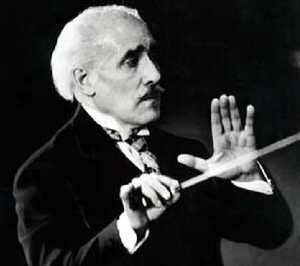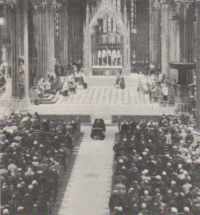 SKC Films Library SKC Films Library |
| SKC Films Library >> Musics >> Biography: Other |
 Arturo
Toscanini Arturo
Toscaniniorchestra conductor Arturo Toscanini was born in Parma, Italy, on March 25, 1867, the oldest of four children and only son of Claudio and Paola (Montani) Toscanini. He won a scholarship to Parma's Royal School of Music at the age of nine, where he studied cello and graduated with maximum honors in both cello and composition at eighteen. In 1886, Toscanini joined the orchestra of an opera company that toured South America. On June 30th, the company's conductor was booed off the stage during a performance of Aida, and Toscanini was persuaded by his fellow musicians to take up the baton because he knew the entire opera by heart. Despite having never conducted before, Tosacanini led the orchestra through the rest of the opera and received astounding acclaim from audience and musicians alike. He went on to conduct eighteen more operas that season, all with great success. Having established himself as an extremely talented conductor at the tender age of nineteen, Toscanini was one of the world's most recognized, and most popular, conductors for the next 60+ years. Toscanini made his first appearance as a conductor in Italy at the Teatro Carignano in Turin on November 4, 1886. In the decade that followed his Italian premiere, he led orchestras for the world premieres of Puccini's La bohème and Leoncavallo's Pagliacci. He conducted his first symphonic concert in 1896, and by 1898 he was resident conductor at the famed La Scale opera house, where he remained until 1908. Returning to La Scala as music director in the 1920's, he took the Scala Orchestra on a tour of the United States in 1920-1921, during which he also made the first of many recordings (for the Victor Talking Machine Company). From 1908 to 1915, Toscanini was the principal conductor of the New York Metropolitan Opera. Returning to Italy during World War I, he was a supporter of Fascism until Benito Mussolini came to power in 1922. He became conductor of the New York Philharmonic Orchestra in 1926, and remained in that position until 1936. In 1930-1931, the New York Philharmonic became the first non-German orchestra to perform at Bayreuth, and Toscanini became the first non-German conductor to appear there. From 1934 to 1937, Toscanini conducted at the annual Salzburg Festival. In 1936, he conducted the inaugural concert of the Palestine Symphony Orchestra in what is now Tel Aviv; he later conducted that orchestra in Jerusalem, Haifa, Cairo, and Alexandria. In 1937, Tosacnini became the music director of the NBC Symphony Orchestra, which had been established especially for him. The orchestra debuted on NBC radio on December 25, 1937, and gave its final performance on April 4, 1954, with Toscanini at the podium for every single performance.
Left: Francis Cardinal Spellman, Archbishop of New York, presided over Toscanini's funeral service at St. Patrick's Cathedral in New York City, New York. SEE ALSO |
| SKC Films Library >> Musics >> Biography: Other This page was last updated on 06/10/2017. |
